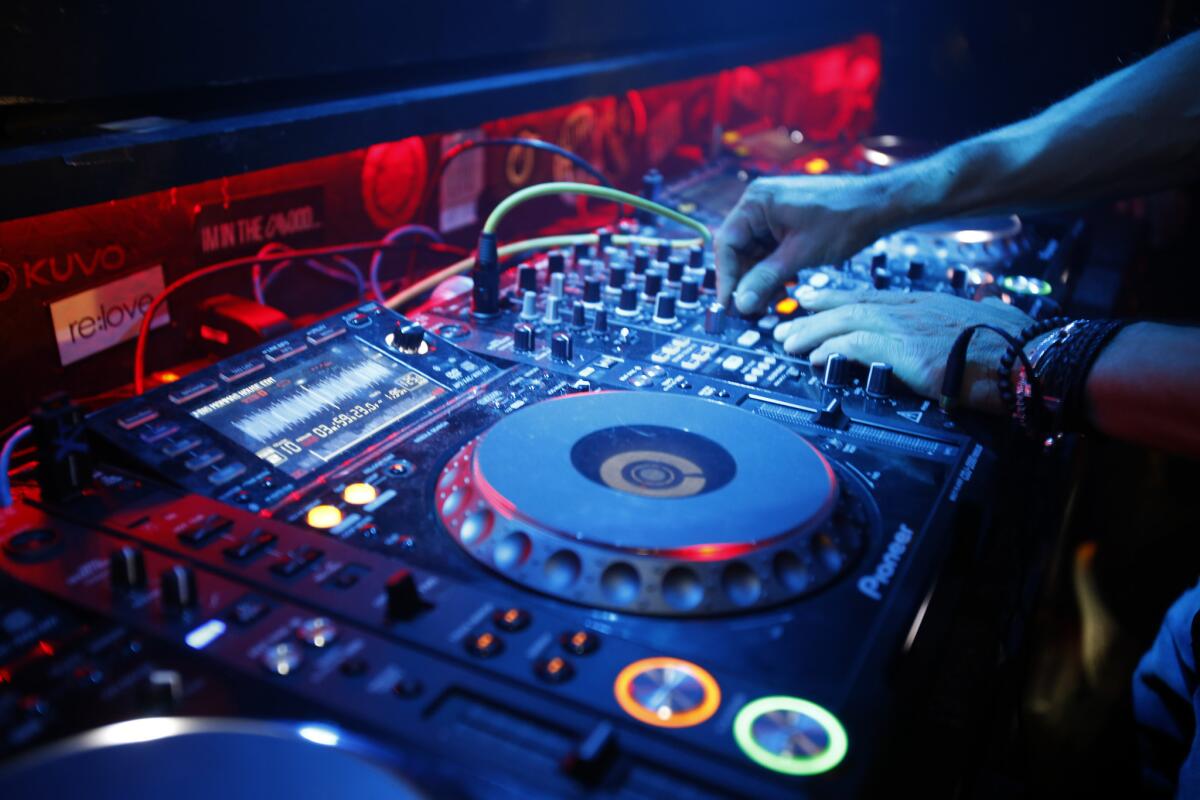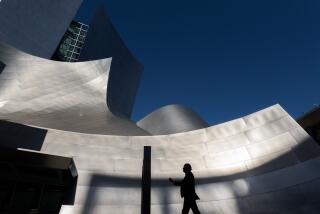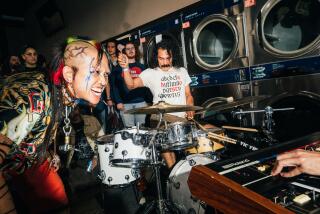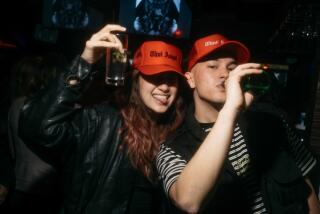With EDM now mainstream, Hollywood club Sound finds niche underground

Kobi Danan, owner of the nightclub Sound in Hollywood, has a talent for throwing dance music shows in potentially difficult environments.
In 1998, when he was an aspiring concert promoter in Jerusalem, he once booked the Iranian American house duo Deep Dish to play a club there. It was an atypical show for Israel, which has long been in conflict with Iran, and artists whose families hail from Iran didn’t often play there.
“People couldn’t believe it; that concert made the front page of the papers,” Danan said.
But for the last few months, he has embarked on a different kind of nightclub cultural exchange. He’s been quietly retooling Sound into a spare and raw home for his favorite underground electronic music, just a block away from Hollywood Boulevard’s extravagant, often over-the-top stretch of nightlife.
The move illustrates the choices L.A.’s electronic music nightclubs face as competition for talent and sky-high DJ performance fees have made electronic dance music an increasingly low-margin business. For Sound and other clubs like it, Vegas-style super-club glitz is looking more like a mirage.
But that might end up being better for the music.
Danan, who ran the Music Box (now the Fonda Theatre) from 2010 to 2012, was one of three partners who opened Sound in 2012. The club, with its projection-mapped LED walls and behind-the-DJ table seating for big spenders, was part of a wave of luxe L.A. venues catering to the rising tide of young dance music fans (others included Create, Lure, Greystone Manor and a freshly remodeled Avalon nearby).
Prospects looked good. Super-producer Kaskade played Sound while also selling out Staples Center and headlining the 400,000-capacity Electric Daisy Carnival in Las Vegas. Jay Z threw an after-party there. The club sent Sound-branded portable speakers out to dance-music tastemakers in L.A.
But then top DJs began commanding hundreds of thousands of dollars for concerts, and midtier and emerging acts began charging commensurate fees — sometimes five figures a night for club-sized shows. The spate of new EDM venues and festivals also meant bidding wars for DJ talent.
When Danan took sole control of Sound midway through last year (his firm Vigil bought out his partners’ shares; one of them, Rob Vinokur, left to focus on his venue Playhouse, and Danan says the two remain close), he knew that the mainstream EDM ride had to stop at Sound. It just wasn’t adding up anymore.
“We went crazy over budget building this place at first,” Danan said. “Since we usually only charge $25 max for tickets, at 500 capacity you can do the math. We can do very well here, but it’s also a roller coaster, and it’s a lot more difficult to make money than people realize. Even in Vegas, those places net less than you think.”
He soon realized that if he were going to have all the white-knuckle anxiety of running a dance music club in today’s marketplace, he should just book the music he really wanted to hear.
His shows have since jettisoned most high-wattage EDM for the kinds of retro house, techno and bass music that Danan grew up on. Pattern Bar’s Eduardo Castillo just hosted an installment of his beloved Voodoo party at the reworked Sound; French disco king Breakbot, rising house force Lee Foss and the svelte Australian Anna Lunoe are among the club’s coming headliners. “The focus is clear now,” Danan said.
The DJ booth has been moved to the rear of the club, freeing more space for dancing. No more lofty tables for bottle-popping behind the mixing booth. And the graphics-heavy projection mapping has given way to intentionally empty picture frames that evoke the industrial spaces that first gave rise to house and techno music.
“The team at Sound has consistently pursued a music policy that provides an alternative to the mainstream EDM experience,” said Pete Tong, the DJ and iHeartRadio broadcaster who hosts his All Gone Pete Tong residency series there. “The club size, layout and technical spec are totally geared toward an underground experience.
“Los Angeles is a huge and diverse city, and it’s important to have a selection of venues that are prepared to take risks and do something different.”
Underground parties such as Culprit Sessions, a Club Called Rhonda and Sarcastic Disco have long been staples of downtown and the Eastside, but Sound’s changes suggests that even Hollywood is shifting that direction. Israeli producer (and new Angeleno) Guy Gerber, fresh off his Diddy-collaborative LP “11 11,” will bookend his sets at the Coachella festival in April with monthly residencies at Sound modeled on his freewheeling, psychedelic Rumors parties in Ibiza, Spain.
“People got tired of [EDM], and they’re starting to explore where this music is originally from,” Gerber said. “I’m not against bigger things, but you have to present an alternative to only having big names, big lineups, just more and bigger all the time. You can’t just go out and smash yourself; we have to have a discussion about why we’re all here.”
Fans who’ve grown tired of the major festivals and megaclubs are looking for smarter options, and even the most discerning audiences (the kind who would go to Hollywood on a weekend only if they were ambulance-bound to Kaiser) are now braving the boulevard masses to find them at Sound.
“I probably see a show at Sound at least once a month, and I would never consider myself the club type either,” said Niles Howard, a music video and commercial editor who lives in Los Feliz and most recently caught the synth-funk duo Chromeo there. “It’s not your typical Hollywood crowd, the sound system is nuts, and they book great acts like Pete Tong and Classixx.”
Nick Sabine, co-founder and director of the popular independent online dance music site Resident Advisor, also thinks that L.A. fans’ tastes are shifting in that direction. “Recently, it feels like the sustainable framework of a burgeoning movement is in place,” he said. The website is opening an office in L.A., and Sabine said visitors to the site from Southern California were up 80% over the last year and a half.
“With a larger audience now discovering and embracing this music, there is a desire to dig deeper and understand the wider arc of electronic music. L.A. now has an ecosystem where this necessary diversity can thrive.”
The shift has brought Sound new credibility, but moving underground is not a panacea. “We get almost no walk-ups down Las Palmas,” Danan said, referring to pedestrian passers-by stopping in on a whim, which makes savvy booking even more essential for the club. And “even at the top end of the underground, it’s still pricey” to hire quality DJ talent, Danan said.
Despite all the attention on huge festivals and pop crossover stars like Avicii, the economics of EDM feel more and more like the 2007 mortgage market, and it’s never been more challenging to run a profitable club-sized venue. But as listeners’ palettes expand past mainstream EDM, Sound may have finally found its angle by going more niche.
“Yeah, we’ve passed through some rough times,” Danan said. “But there’s still no better feeling than standing up here and seeing the whole room turned up to 10.”
Twitter: @AugustBrown
---------------------------------
EDM nightclubs
Sound
1642 N. Las Palmas Ave., L.A.
Create
6021 Hollywood Blvd., L.A.
Lure
1439 Ivar Ave., L.A.
Avalon
1735 N. Vine Ave., L.A.
Exchange
618 S. Spring St., L.A.
More to Read
The biggest entertainment stories
Get our big stories about Hollywood, film, television, music, arts, culture and more right in your inbox as soon as they publish.
You may occasionally receive promotional content from the Los Angeles Times.







